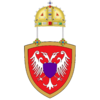Yanwen
| Yanwen | |
| Flag | Coat of arms |
|---|---|

|

|
| Motto: Mana Qonqasunchikchutaq
"Nevertheless, we will not forget" | |
| Anthem: The War Song | |
| Locator map | |
 | |
| Capital city | Qheca |
| Largest city | Viracachá |
| Official language | Remana |
| Other languages | Wariano, Aruxa, Auresian, Livaryan, Bahaso Sokoku |
| Ethnic groups | Ruma, Waria |
| Religion | Chakrana |
| Demonym(s) | Chaskan |
| Government | |
| Government Type | Government type |
| King | name |
| Uma Akllaxqa (Prime Minister) | Yunkar Munawasi |
| Legislature | The Concordat |
| Establishment | |
| The Founding of Qheca | date 1 |
| Beginning of the Empire | 6492 RH |
| The Quiet Revolution | 7590 RH |
| Area | |
| Total | 1,983,088.96 km2 |
| Water % | 0.0% |
| Population | |
| Total | 85,219,877 |
| Density | 42.97/km2 |
| Economy | |
| Economy type | Market Socialism |
| GDP (total) | Ꞡ 525,506,341,492.37 |
| GDP per capita | Ꞡ 6,166.48 |
| Currency | samp_nat_currency |
| Currency symbol | |
| Inequality index | 0.0 |
| Development index | 0.0 |
| Other information | |
| Time zone | 0 |
| Driving side | right |
| Calling code | |
| Internet code | .ch |
Yanwen (嫣) is a large country in western Davai, bordering the Sensumen Sea, as well as the islands of Kamura, to the west. Yanwen is notable as being a civilization of eight bèi (輩) or factions, each of which has competing interests in the empire; the emperor, all-powerful though he technically may be, is there to act more as a referee. Despite this, each faction has seen its way to advancing the development of Yanwen considerably as time has gone on. Yanwen is also historically famous for its silk and its tea.
Etymology
Yanwen is derived from yān (嫣), itself derived from the Old Yannic word *qhran, meaning "beautiful". Yān as a word is used for both the primary river system in Yanwen, and for the Yan people who spread out from along its banks.